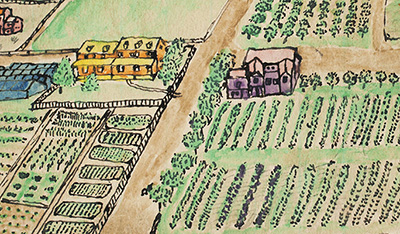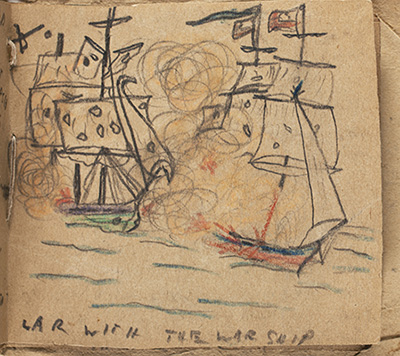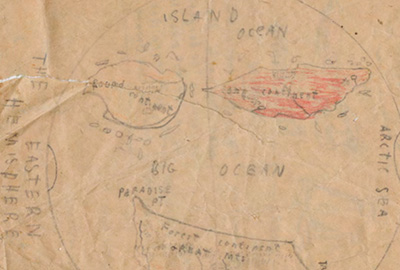This year, Professor Karen Sánchez-Eppler will delve into various archives to study a culture that’s often overlooked by scholars, though we all have at some point belonged to it: the culture of children.
Sánchez-Eppler, Amherst’s L. Stanton Williams 1941 Professor of American Studies and English, has received a fellowship from the American Council of Learned Societies to conduct research for her book project, In the Archives of Childhood: Personal and Historical Pasts. For much of her 2014–2015 sabbatical year, she will be at Chicago’s Newberry Library on a long-term fellowship funded by the Andrew W. Mellon Foundation and the Lloyd Lewis Fellowship in American History. In the spring, she will continue with a short-term research fellowship at the Winterthur Museum in Wilmington, Del., and additional research at the Cotsen Children’s Library at Princeton University. Her focus: the everyday lives of children in the 19th Century.

The Nelson family farm, drawn circa 1890 by the brothers who grew up there
“It’s very easy to think about childhood as trivial,” Sánchez-Eppler said, “and so when the American Council of Learned Societies, which is among the most prestigious American funding sources for humanities and social science research, thinks that this is worth doing, this is exciting.”
In the Archives of Childhood examines how our ideas about childhood inform our ideas about history. Sánchez-Eppler will be looking at children’s own accounts of their lives in the 19th century. This is an obvious strategy, but a groundbreaking one, she believes.
“Childhood is the bit of the past that every adult knows. … But no historian has said that, or has thought about what that implies for the work of history,” she said. “To really fill that out, think that through, is what I’m trying to do with this project.”
The lives and opinions of children are devalued in many of the same ways that the histories of women and nonwhites were given short shrift in generations past, she said.

Karen Sánchez-Eppler
“I feel a little bit like how it must have felt doing women’s history scholarship in the ’70’s,” she said. “We’ve come to think of race and class and gender as sociologically significant identity categories, and I think one of the crucial lines in my scholarship has been to say age is also similarly crucial.”
We can’t rule children out because they grow up, she said. “We tend to think about those other categories as stable, but we know that class actually isn’t stable, that people can have class mobility, [and] we similarly know that race is much more fluid than we treat it.”
Sánchez-Eppler’s first book was Touching Liberty: Abolition, Feminism, and the Politics of the Body, published in 1993. The idea for her current research first germinated during the development of her 2005 book, Dependent States: The Child's Part in Nineteenth-Century American Culture.
“I’d written quite a few chapters just looking at how adults were talking about children,” she said. “My first book had been on abolitionist and feminist politics, and it would have never occurred to me that I could write a responsible book if I had only been using sources from white men. But here I was writing a book about childhood in which I was only having sources from adults, and that seemed completely fine to me. I suddenly had this moment of ‘Oh my God—I never would have done this with my first project.’”
Archival materials that will inform the professor’s latest research include letters, school assignments and other ephemera. At the Winterthur Library, she will look at a collection of children’s board games.
Sánchez-Eppler said she particularly relishes the detective work involved in uncovering these overlooked stories.
“A lot of this work has been about going to archives [where the archivists] don’t necessarily know that they have rich materials for children’s history,” she said. “I'm going to work at collections where I have no idea what I’m going to find, and where nobody’s really looked at the child-made stuff in that collection.”
In the spring, she taught a Mellon Research Seminar on this topic, using recently discovered writings of Arthur and Elmer Nelson, boys who grew up in rural Goshen, New Hampshire in the 1890s.
Pamela Russell, Head of Education and Andrew W. Mellon Curator of Academic Programs at the Mead Art Museum, likes to attend small-scale auctions for sport, and in early 2013 she won the bid on a shoebox full of what the auctioneer simply called as “children’s doodles.” They were in fact about 60 miniature books describing farm life through children’s eyes, as well as richly illustrated stories of imaginary lands and historical exploits.


The Nelson boys' maps include "the round continent" and "the long continent."
Russell later showed the books to Sánchez-Eppler, made them the subject of her spring seminar. The books are now in the college’s Archives and Special Collections.
“The little books are just adorable,” said Sánchez-Eppler.
Students in the seminar scanned and transcribed some of the little books. Their work, posted to the project’s website, continues: Christopher Tamasi ’15 is working on this project throughout the summer as a Mellon Student Research Fellow.
The Nelson brothers “really redefined what it meant to play,” said Tamasi. “They created this imaginary world, took on alter egos …. It’s been really cool to dive into that.”